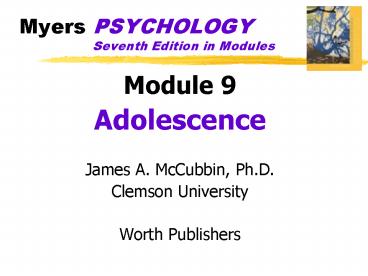Myers PSYCHOLOGY Seventh Edition in Modules - PowerPoint PPT Presentation
1 / 15
Title:
Myers PSYCHOLOGY Seventh Edition in Modules
Description:
Title: Introduction to Psychology Author: Preferred Customer Last modified by: sjasd Created Date: 7/7/1998 3:26:24 PM Document presentation format – PowerPoint PPT presentation
Number of Views:147
Avg rating:3.0/5.0
Title: Myers PSYCHOLOGY Seventh Edition in Modules
1
Myers PSYCHOLOGY Seventh Edition in Modules
- Module 9
- Adolescence
- James A. McCubbin, Ph.D.
- Clemson University
- Worth Publishers
2
Adolescence
- Adolescence
- the transition period from childhood to adulthood
- extending from puberty to independence
- Puberty
- the period of sexual maturation
- when a person becomes capable of reproduction
3
Adolescence
- Primary Sex Characteristics
- body structures that make sexual reproduction
possible - ovaries--female
- testes--male
- external genitalia
- Secondary Sex Characteristics
- nonreproductive sexual characteristics
- female--breast and hips
- male--voice quality and body hair
- Menarche (meh-NAR-key)
- first menstrual period
4
Adolescence
- In the 1890s the average interval between a
womans menarche and marriage was about 7 years
now it is over 12 years
5
Adolescence
- Throughout childhood, boys and girls are similar
in height. At puberty, girls surge ahead
briefly, but then boys overtake them at about age
14.
6
Body Changes at Puberty
7
Kohlbergs Moral Ladder
- As moral development progresses, the focus of
concern moves from the self to the wider social
world.
Morality of abstract principles to
affirm agreed-upon rights and personal ethical
principles
Postconventional level
Conventional level
Morality of law and social rules to
gain approval or avoid disapproval
Preconventional level
Morality of self-interest to avoid punishment or
gain concrete rewards
8
Postconventional stage
- Children under the age of 9, however some adults
never get past this stage. - Example Heinz was wrong to steal the drug
because he might get caught and put in jail or
Heinz was right to steal the drug because he
would have his wife around longer. - Will I be punished?
- Will I get what I want? Does the victim deserve
it?
9
Conventional stage
- This type of reasoning is typical of most adults.
- Appears during Piagets formal operational stage.
- Example Heinz was wrong to steal because he was
breaking the law, or Heinz was right because he
had to protect a family member. - Will my family or friends get mad at me?
- Is it right according to law?
10
Postconventional stage
- Most people dont even reach this final level.
- Example Heinz was right because everyone has a
right to live and he was simpky helping his wife
or Heinz was wrong because everyone must respect
the property of others. - Is there a higher good that can come from the
action I do?
11
Examples
- 1. Katie has five tests in one day. She is a
good student but didnt have time to study for
her Psychology test. The girl that she sits next
to is also a good student. That girl has copied
from Katie numerous times before. Katie thinks
that should never have had five tests in one day. - 2. Josh thought about leaving school early and
going to a hockey game. He stayed in school
because he was afraid of getting caught. - 3. Ashleys friends were at the mall and someone
suggested that they do a little shoplifting.
Ashley doesnt participate abd said that stealing
is wrong. - 4. Hope lives in a war-torm region of the world.
She secretly distributes food to orphans living
in the streets because this activity is against
the law in the part of the world.
12
Eriksons Stages of Psychosocial Development
13
Eriksons Stages of Psychosocial Development
14
Adolescence Social Development
- Identity
- ones sense of self
- the adolescents task is to solidify a sense of
self by testing and integrating various roles - Intimacy
- the ability to form close, loving relationships
- a primary developmental task in late adolescence
and early adulthood
15
Adolescence Social Development
- The changing parent-child relationship































